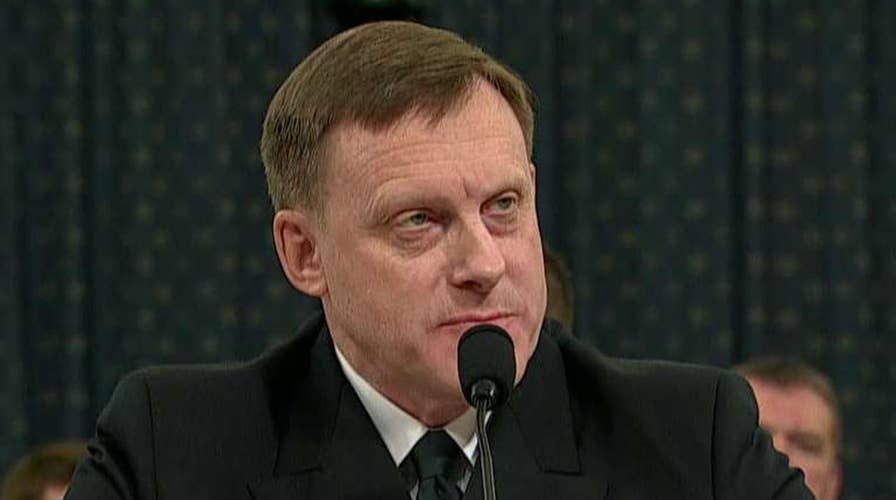NSA director: We are greatly concerned about leaks
Mike Rogers gives opening statement at House Permanent Select Committee on Intelligence hearing on Russia's involvement in 2016 election
National Security Agency Director Mike Rogers joined Republican lawmakers in blasting “unacceptable” leaks of sensitive information, during testimony Monday before the House Intelligence Committee.
Adm. Rogers spoke alongside FBI Director James Comey, both holdovers from the Obama administration, in a hearing addressing claims of Russian interference in the 2016 election and other controversies.
Comey confirmed at the hearing that the bureau is investigating Russia’s meddling as well as any potential ties to the Trump campaign. But both officials also decried intelligence leaks, which GOP lawmakers describe as a major security threat – some of those leaks have fueled recent reports about the status of the FBI’s Russia probe.
Rogers said he is “greatly concerned about leaks of classified information.”
Comey echoed Rogers, stressing “how seriously we take leaks of classified information.” He also said he’s seen “a lot of conversations about classified matters” showing up in the press, and “a lot of it is dead wrong.”
As the officials lamented leaks, Republicans sought to press the witnesses for details on who might be responsible. Rep. Trey Gowdy, R-S.C., asked Comey to confirm what former Obama administration officials could have had access to “unmasked” names – or American citizens incidentally recorded in conversations with surveillance targets.
The term “unmasked” refers to what happens when the inadvertent subject of government surveillance is named and documented, as was reportedly done with former Trump National Security Adviser Michael Flynn in conversations with Russia’s ambassador, leading to his resignation.
When asked specifically if he briefed former President Barack Obama on any calls involving Flynn, Comey said he couldn’t get into the particular case or any conversations he had with the president.
Gowdy also read off a list of names, asking about former Director of National Intelligence James Clapper, former CIA Director John Brennan, former National Security Adviser Susan Rice, former Deputy National Security Adviser Ben Rhodes, former Attorney General Loretta Lynch and former acting Attorney General Sally Yates. Comey would not confirm specifics, but agreed those positions could have access to “unmasked” names.
Though they may have access to the names, that doesn’t meant they were in a position to do the “unmasking.”
When Rogers was asked how Flynn’s identity could have been revealed, he said, “I’m not going to discuss hypotheticals about individuals.” Rogers said he and 19 other people at the NSA have the authority to unmask the identity of Americans.
Rogers said he couldn’t provide the number of Americans who have been “unmasked” since June 2016 until more research is completed, but did acknowledge that when U.S. citizens are unmasked, it hurts national security.
Rogers has served in the Navy for the past three decades and graduated from the National War College. He was appointed by Obama as the director of the NSA, taking office in April of 2014 in the wake of massive leaks by NSA whistleblower Edward Snowden.
Last fall, he drew criticism when he met with President Trump in New York, reportedly angering senior members of the Obama administration by failing to clear the visit with his superiors. It was reported at the time that Clapper and Defense Secretary Ashton Carter called for Rogers to be fired -- not because of his meeting with Trump, but because of security breaches at the NSA and questions over his leadership.
When asked for a response to calls for his dismissal in November, Rogers said "I'm not going to go down that road," telling a reporter, “I'm accountable for my actions."
Rogers also said Monday there was no evidence to support the claim that the Obama administration instructed British intelligence organization GCHQ to spy on the Trump team during the campaign.












































